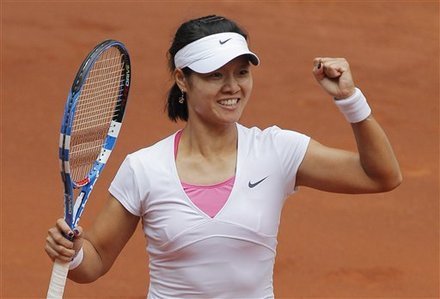This year started with a bang for Chinese tennis star Li Na. In January, she won the Australian Open, climbing to a career-high of world number two. She celebrated in typically wisecracking fashion, thanking her agent — “[He] made me rich” — before training her sights on her husband: “[He] fixes my drink, fixes my racket . . . so thanks a lot — you’re a nice guy . . . And also, you’re so lucky [to] find me.”
对于中国网球名将李娜来说,今年的开端是令人振奋的。1月,她赢得了澳网公开赛,世界排名上升到第二位,创下职业生涯新高点。李娜以一贯的幽默风格庆祝了此次胜利,先是感谢她的经纪人“让我变得富有”,然后将目光投向她先生,感谢他“为我倒饮料,为我修球拍……所以非常感谢你,你是个好人……而且你也很幸运(能)找到我”。

China felt pretty lucky too. Li had become a national hero when she won the French Open in 2011, gaining millions of fans with her dominance on court and distinctive personality. But by this September, it was all over. After struggling to recover from knee surgery, Li was forced to retire. She broke it to her millions of social media followers in a Facebook post: “My body kept telling me that, at 32, I will not be able to compete at the top level ever again.”
中国也感到非常幸运。2011年李娜赢得法网公开赛时,她已然成了民族英雄,她在球场上的掌控力以及鲜明的个性为她俘获了数以百万计的球迷。然而到了今年9月,这一切都结束了。由于无法从膝盖手术后恢复,李娜被迫退役。她在自己的Facebook上向上千万名关注者公布了这一消息:“我的身体一直告诉我,32岁的我无法再次承受最高水平的竞技。”
Li was known for her heavy groundstrokes, especially her forehand, which marked her out as an opponent able to excel in new-style power tennis. In an interview with the FT over email, she notes that her injuries merely added to the pride she takes in her achievements: “I am proud that I was able to overcome many obstacles, including my knee issues. People don’t realise how hard it is to play at the highest levels when you are injured. I am proud of my fighting spirit.”
李娜以强力的落地球——尤其是正拍——著称,这让她在更追求力量的新式网球中脱颖而出。在接受英国《金融时报》电邮采访时,她表示伤病只会令她对自己所取得的成绩更加自豪:“我为自己能克服这么多障碍,包括膝伤。人们不知道受伤后还要保持高水平发挥有多么困难。我为自己的奋斗精神感到自豪。”
But it was Li’s individuality that won her adoration in a country where athletes raised in the state-run sports machine often seem like automata. These nonconformist tendencies revealed themselves early. When she violated the strict norms of the state sports academy by falling in love with her partner in mixed doubles, Jiang Shan, now her husband. The academy forced the pair to stop playing together. Shortly afterwards, Li abruptly informed the school in a letter that she was giving up tennis. She spent two years studying journalism before a trusted coach persuaded her to return to the fold.
中国的运动员在举国体制中长大,常常被看做机器人,李娜的独特个性为她赢得了人们的喜爱。她的不墨守成规在早期就已经显现出来。她违反国家队的严格规定,与混双搭档姜山(她现在的丈夫)谈恋爱。国家队拆散了这对组合,阻止他们一起打球。不久以后,李娜给国家队写了封信,说她要放弃网球。她在大学修了两年的新闻学,然后在一位信赖的教练的说服下重返球场。
Her legacy has been to help turn her homeland into a tennis-loving nation. She now plans to build on that with her own training academy. “Right now, we are in the very early stages of building and creating my academy,” she explains. The aim, she adds, is not just to train players, “but to give them a road map to playing professional tennis. I want to teach them everything I’ve learnt in my 15-year career.”
李娜出色的成绩让她的祖国变成了一个热爱网球的国度。她现在正计划以此为契机成立自己的网球学校。她解释说:“目前我的网球学校仍处于创建初期阶段。”她还说自己的目标不仅是为了训练球员,“还是为了帮他们规划职业网球道路。我想把自己15年职业生涯所学到的一切都教给他们。”
In 2008 Li and a handful of other promising players were released from the state system and allowed to choose their own coaches and support teams. They were also allowed to keep more of their winnings, with the proportion remitted to the Chinese Tennis Association reduced from 65 per cent to 12 per cent.
2008年李娜和其他一些有前途的球员脱离了举国体制,被允许自己选择教练和支持团队。这些球员还被允许保留更多奖金,交给中国网球协会的金额比例从65%减到12%。
Today, Li acknowledges she benefited from having the best of both worlds in her tennis development. This will influence her approach to training others. “The Chinese system did so many great things for me: it gave me the foundation of my game, taught me the best work ethic and made me mentally strong,” she says. “The exposure to some of the top western coaches allowed me to take my game to another level, so this combination was critical and I will try to bring [those] methods [and] experiences to my academy.”
如今,李娜承认她在自己的网球职业发展过程中享受到了中西不同体制的好处。这将影响她培训其他人的方法。她说:“中国的体制让我获得如此多好处:为我打下了扎实的网球基础,教会我最好的职业道德,让我在精神上变得强大。而接受一些西方顶级教练的指导则让我的竞技水平提高到新的水平。因此,中西结合非常重要,我将努力把(这些)不同的方法(和)经验带到自己的学校里。”
Li’s career has often been narrated as a clash between China’s enduring paternalistic habits and the individuality of the country’s younger generations — symbolised by a tattoo on her chest that she used to cover up with tape but eventually stopped bothering to. Li has 23 million followers on Weibo, the Chinese microblogging site. “I’ve enjoyed doing social media and connecting with my fans that way. It has been a very helpful way of controlling the message,” she says.
李娜的职业生涯通常会被描述为中国长期的家长式管理习惯与年青一代追求张扬个性之间的冲突——李娜曾试图用胶带遮盖自己胸前的纹身,但最终懒得再费这个事。李娜在微博上有2300万粉丝,“我喜欢上社交媒体,并通过它与我的粉丝交流,它非常有助于控制(不实)消息”。
Yet Li is nothing if not patriotic. “Every time I step on the court and it says China next to my name, I have such great pride,” she says. “When I am travelling the world and hear the Chinese fans cheer me on, it is just an amazing feeling — something I will really miss. It’s hard to explain what it feels like, but it fills my heart with the utmost joy.”
不过,李娜非常爱国。她表示:“每当我踏上球场,我的名字旁边标着我来自中国的时候,我都感到非常骄傲。当我在世界各地打比赛的时候,总能听到中国球迷为我加油,这种奇妙的感觉真的让我非常怀念。很难具体形容,但它让我的心充满了至高无上的快乐。”
Individualism still has its place, however, especially when it comes to technique. When asked if her academy will be advocating the heavy topspin and “extreme western” forehand grips that have become popular, she says she doesn’t intend to recommend a specific style for all. “One of the great things about tennis is the individuality. We need to find the best style for each player and help them develop their own style . . . I am very confident the next generation of players from China will be better than mine.”
然而,个性仍然有其一席之地,尤其就技术而言。当被问到她的网校是否会提倡现在流行的强力上旋打法和“极为西方的”正拍握拍方式时,李娜表示她不打算为所有学员推荐一个特定的风格,“网球一个美妙之处就在于它的个性,我们需要为每个球员找到最好的方式,帮助他们发展自己的风格……我坚信,下一代的中国球员将会做得比我更好。”













